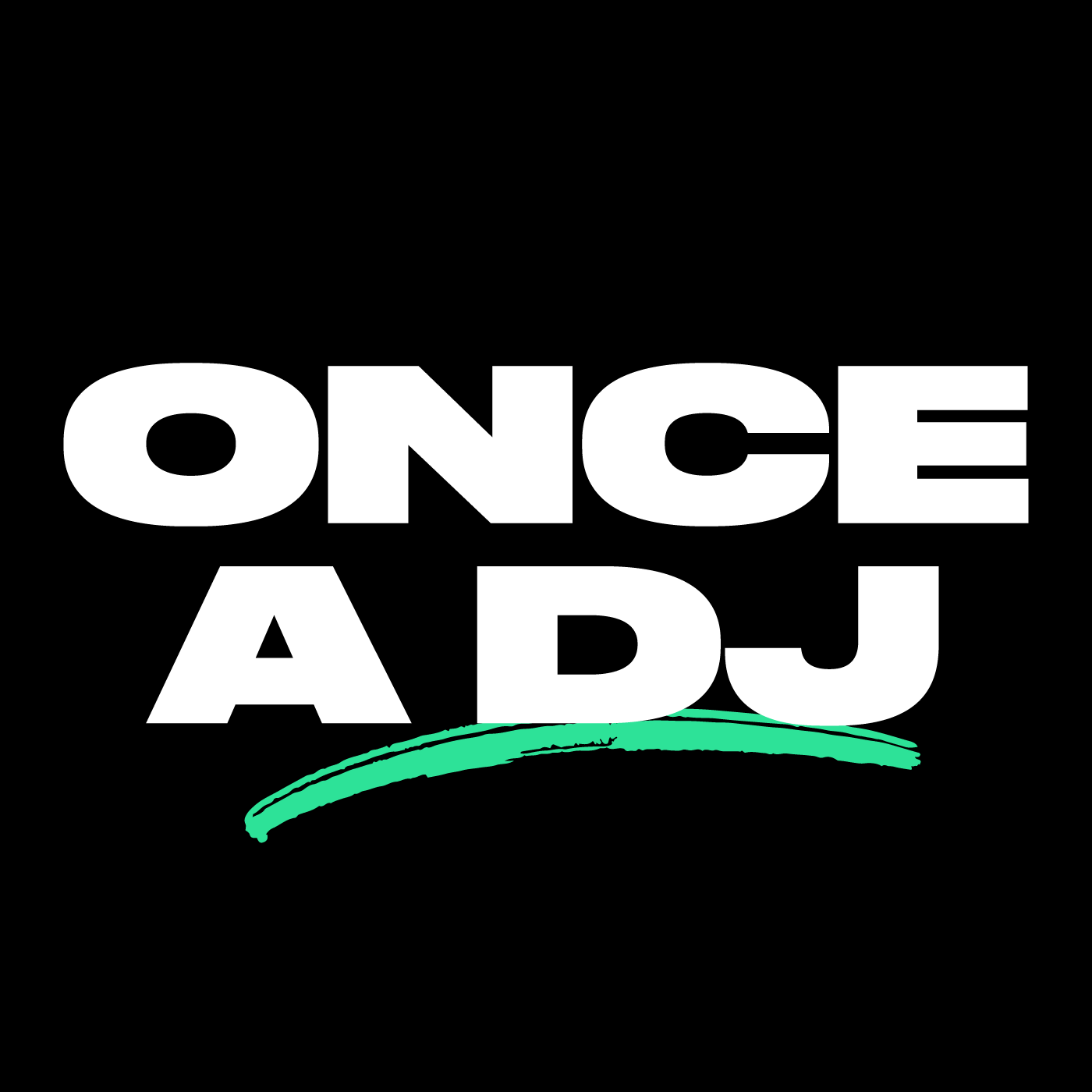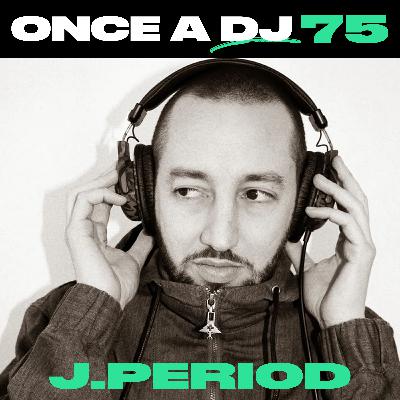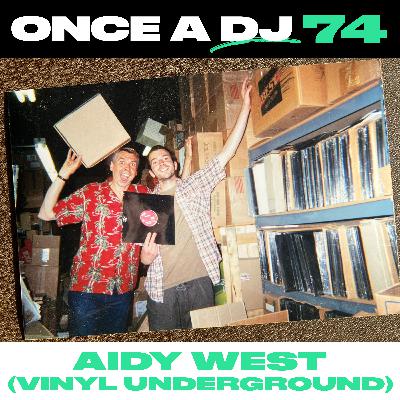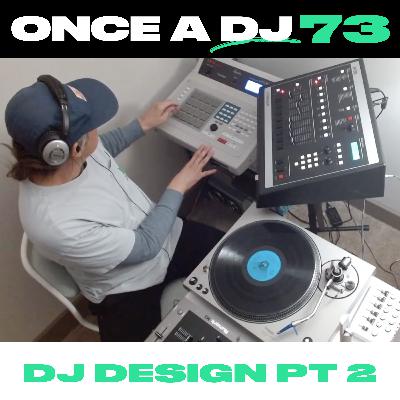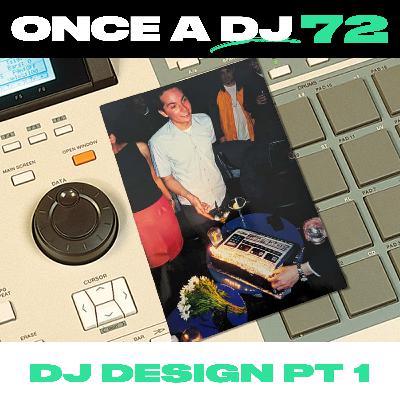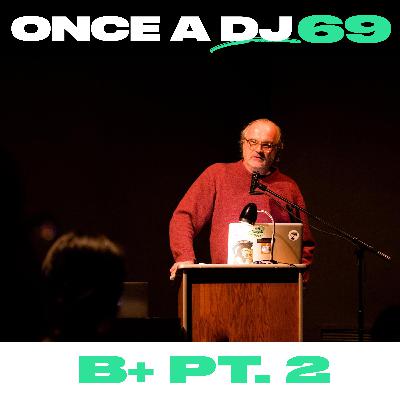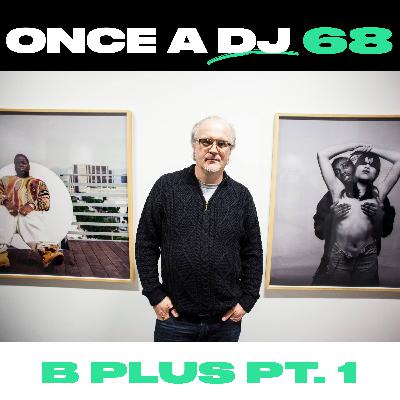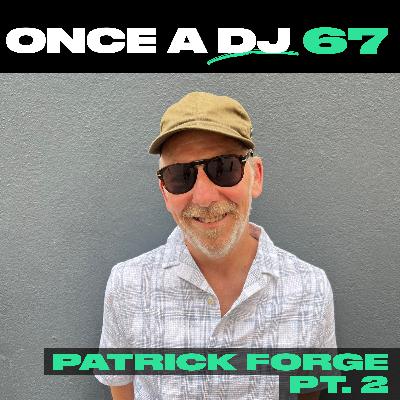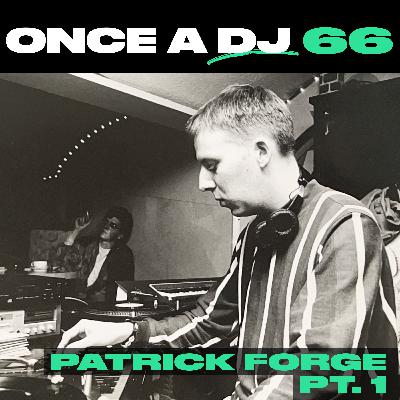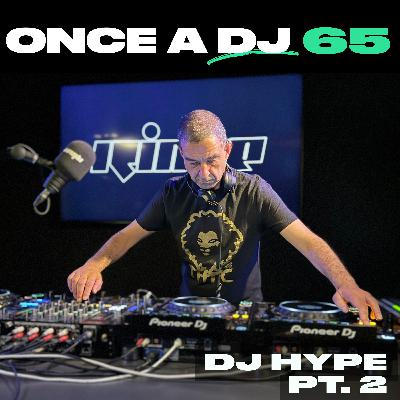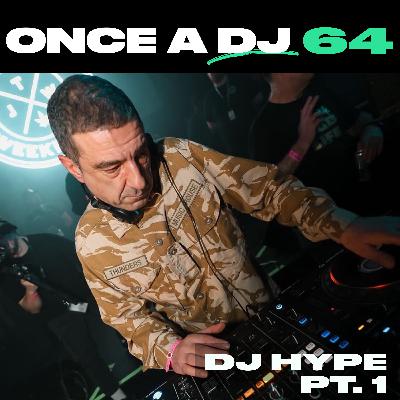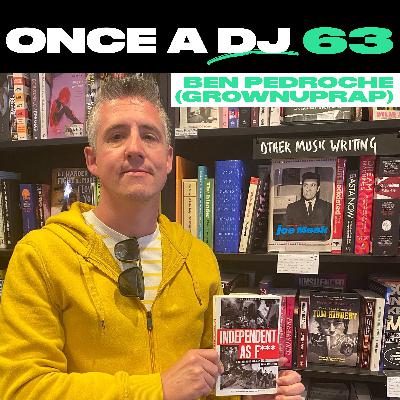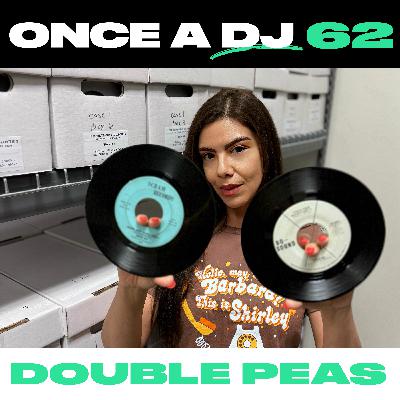Discover Once A DJ
Once A DJ

Once A DJ
Author: Remote CTRL
Subscribed: 16Played: 385Subscribe
Share
© Copyright 2026 Remote CTRL
Description
Welcome to "Once a DJ," the captivating podcast hosted by Adam Gow, better known as DJ Wax On. For two decades, DJ Wax On has immersed himself in the world of DJing, exploring the art form alongside his other professional pursuits. In this show, he speaks to legends of the DJ game and contributors to the culture, about where their passion for the art has taken them. With a genuine interest in personal growth and a deep appreciation for the unique skills acquired through DJing, he invites you to embark on a journey of self-discovery and exploration.
A https://remote-ctrl.co.uk podcast
A https://remote-ctrl.co.uk podcast
85 Episodes
Reverse
Once A DJ is brought to you by:https://www.vinylunderground.co.uk - 10% off your next order using code onceadjhttps://www.sureshotshop.com/ - Record adapters (including customs) & accessorieshttps://myslipmats.com/ - Custom and off the shelf Slipmats, dividers and more.Once A DJ is a https://remote-ctrl.co.uk productionOther ways to support the showFollow the show on Spotify or Apple PodcastsAny feedback or questions? Hit up the Once A DJ Instagram PageSubscribe to the Once A DJ PatreonBuy your Once A DJ Sureshot 45 adapter clamps6-time snooker champ and lifelong record collector Steve Davis took the mainstream by surprise when he started DJing...his career blossomed quickly, but he'd been paying his dues with digging and collecting for decades previous...In this interview we get into the day job and also the new hustle, and how they complement each other, and also how they're very different.In this fascinating episode, we sit down with one of Britain's most famous sporting icons - six-time world snooker champion Steve Davis - to explore his journey into electronic music, DJing, and his band The Utopia Strong.Steve shares incredible stories about the golden age of snooker in the 1980s, including the legendary 1985 World Championship final against Dennis Taylor that 18.5 million people watched until the early hours of the morning. But more importantly, we dive deep into his lifelong love of music, from discovering prog rock and psychedelic music as a teenager, to becoming a respected DJ on the alternative electronic music scene, to creating experimental instrumental music with The Utopia Strong.This conversation explores the parallels between elite sport and creative pursuits, the importance of obsession and dedication, dealing with success and failure, the power of humor and perspective, and why at 68, Steve feels like Peter Pan with no intention of retiring.Whether you're interested in snooker history, electronic music, or the mindset of elite performers, this episode offers unique insights from someone who's mastered multiple crafts.GuestSteve Davis OBE - Six-time world snooker champion (1981, 1983, 1984, 1987, 1988, 1989), BBC snooker commentator, DJ, and member of electronic music trio The Utopia Strong.Known as the "Romford Terminator" during his dominance of snooker in the 1980s, Steve has become equally respected in the alternative electronic music
Once A DJ is brought to you by:https://www.vinylunderground.co.uk - 10% off your next order using code onceadjhttps://www.sureshotshop.com/ - Record adapters (including customs) & accessorieshttps://myslipmats.com/ - Custom and off the shelf Slipmats, dividers and more.Once A DJ is a https://remote-ctrl.co.uk productionOther ways to support the showFollow the show on Spotify or Apple PodcastsAny feedback or questions? Hit up the Once A DJ Instagram PageSubscribe to the Once A DJ PatreonBuy your Once A DJ Sureshot 45 adapter clampshttps://www.instagram.com/supremelarockhttps://linktr.ee/supremelarockIn this episode of Once A DJ, Adam Gow sits down with the "newly crowned king of the Drum Break", Supreme La Rock. What begins as a nostalgic look at a four-year-old mesmerised by a Christmas turntable evolves into a masterclass on the evolution of hip hop and the relentless pursuit of the perfect record. Supreme recounts his pivotal teenage summers in New York, where witnessing block parties and B-boys first-hand sparked a mission to bring that burgeoning culture back to a then-untouched Seattle.The conversation captures the emotional weight of a life built on "real hip hop," moving from DIY mixers fashioned with toothpicks to international tours and deep-seated friendships with legends like Biz Markie. Supreme reflects on the transition from an "outcast" teen to a world-renowned digger, detailing the shift from 99-cent gambles to chasing rare acetates. It is a reflective journey through the philosophy of selection, the importance of community, and the simple, enduring power of soul music that makes you want to move.
Once A DJ is brought to you by:https://www.vinylunderground.co.uk - 10% off your next order using code onceadjhttps://www.sureshotshop.com/ - Record adapters (including customs) & accessorieshttps://myslipmats.com/ - Custom and off the shelf Slipmats, dividers and more.Once A DJ is a https://remote-ctrl.co.uk productionOther ways to support the showFollow the show on Spotify or Apple PodcastsAny feedback or questions? Hit up the Once A DJ Instagram PageSubscribe to the Once A DJ PatreonBuy your Once A DJ Sureshot 45 adapter clampsThis one picks up where we left off - right at the moment when a mobile DJ dressed as Dr. Stiff meets a pop star called Andy Pickles and accidentally builds one of the biggest hard house labels in the country. Amadeus takes us through the Tidy Trax origin story properly this time: the Hit the Decks albums, the handshake deal that launched everything, and why sometimes the best business moves happen when you're just trying to help a mate out.There's a proper detour into wedding DJing (Amadeus has got opinions), stories about turning up to gigs dressed as a doctor with his wife as a nurse, and the moment he realized he'd gone from making tracks in his bedroom to running a business with 40-odd staff. The conversation wanders through sampling culture, remixing everything, and why nothing's truly original - from disco to hip hop to hard house to the ATV logo. It's not a linear career journey; it's more like watching someone accidentally stumble into their life's work and then double down on it.By the end, we're talking AI, Paul McCartney getting paid for robot Rihanna tracks, and why you can't build a wall to stop a train.
Once A DJ is brought to you by:https://www.vinylunderground.co.uk - 10% off your next order using code onceadjhttps://www.sureshotshop.com/ - Record adapters (including customs) & accessorieshttps://myslipmats.com/ - Custom and off the shelf Slipmats, dividers and more.Once A DJ is a https://remote-ctrl.co.uk productionOther ways to support the showFollow the show on Spotify or Apple PodcastsAny feedback or questions? Hit up the Once A DJ Instagram PageSubscribe to the Once A DJ PatreonBuy your Once A DJ Sureshot 45 adapter clampsAmo/Tidy Trax links:https://www.instagram.com/tidytrax/ (label)https://www.instagram.com/tidyamo/ (Amo)https://www.youtube.com/@tidytraxIn part one of this two-part conversation, we sit down with Amadeus Mozart (Lee Marlow), one half of The Tidy Boys and the architect of the Tidy Empire that defined UK hard house.Born in Kettering in 1965 into a working-class family, Amadeus traces his musical journey from his audiophile father's obsession with the Moog synthesizer to becoming a disco devotee in the punk rock era. We explore his formative years being bullied at school for loving Village People while his classmates embraced The Clash, his discovery of London's underground gay club scene in the 1980s, and navigating the AIDS crisis while waving the flag for gay rights.This episode covers the crucial early years: his friendship with Darren Kennedy, the influence of classical music through his gay housemate Norman, and the loss of his father in 1996 just before his breakthrough success. It's a story of passion, persistence, and staying true to your musical vision against the odds.Key Topics:Growing up with Spotlight on the Moog (1968) - the pre-Kraftwerk electronic revolutionBeing into disco during the punk rock movement (1977-79)The UK's reaction to the "Disco Sucks" movement
Just wanted to share a couple of thoughts in lieu of new episodes for 2026!
Once A DJ is brought to you by:https://www.vinylunderground.co.uk - 10% off your next order using code onceadjhttps://www.sureshotshop.com/ - Record adapters (including customs) & accessorieshttps://myslipmats.com/ - Custom and off the shelf Slipmats, dividers and more.Once A DJ is a https://remote-ctrl.co.uk productionOther ways to support the showFollow the show on Spotify or Apple PodcastsAny feedback or questions? Hit up the Once A DJ Instagram PageSubscribe to the Once A DJ PatreonBuy your Once A DJ Sureshot 45 adapter clampsIn this special episode, we sit down with mixtape legend J.Period for an in-depth conversation about his journey from LA to New York, the craft of storytelling through music, and what it takes to sustain a prolific creative career in the ever-changing music industry.J.Period shares intimate insights into his creative process, from his early days discovering hip hop through Beat Street to becoming one of the most respected mixtape curators in the game. We explore his collaborations with icons like The Roots, Lauryn Hill, Nas, and Q-Tip, and discuss how he's adapted his craft in the streaming era while maintaining artistic integrity.This conversation goes deep into the philosophy of curation, the importance of resilience in creative work, and how to balance prolific output with quality and family life. Whether you're a DJ, producer, or creative professional, there's invaluable wisdom here about staying authentic and building a sustainable career in music.GuestJ.Period - Legendary mixtape DJ, curator, and storyteller known for his innovative blends and narrative-driven projects. Creator of iconic mixtapes including The Best of Lauryn Hill, collaborations with The Roots, Nas, Q-Tip, and many more.Key Topics CoveredEarly influences: Growing up in LA and discovering hip hop through Beat StreetThe move to New York in 1999 and starting the DJ journeyThe craft of mixtape curation and storytelling through musicBuilding relationships with artists like The Roots, Lauryn Hill, and Nasli...
Once A DJ is brought to you by:https://www.vinylunderground.co.uk - 10% off your next order using code onceadjhttps://www.sureshotshop.com/ - Record adapters (including customs) & accessorieshttps://myslipmats.com/ - Custom and off the shelf Slipmats, dividers and more.Once A DJ is a https://remote-ctrl.co.uk productionOther ways to support the showFollow the show on Spotify or Apple PodcastsAny feedback or questions? Hit up the Once A DJ Instagram PageSubscribe to the Once A DJ PatreonBuy your Once A DJ Sureshot 45 adapter clampsAidy West, owner of Vinyl Underground for over 30 years, shares his journey from breakdancing kid to underground record dealer. From attending Fresh '86 at age 14 to shipping directly from Detroit, surviving vinyl's dark days, and witnessing the Record Store Day boom - this is the story of passion over profit in the record game.Chapter MarkersPart 1: Musical Origins (00:02:03 - 00:17:45)00:02:03 - Introduction00:02:41 - Growing up with Madness and two-tone00:04:16 - First records: Buggles and WH Smith Saturdays00:05:09 - The Jam's "Going Underground" changes everything00:06:36 - Breakdancing and electro: "Oral sex spelled A-U-R-L"00:09:33 - Fresh '86: Afrika Bambaataa and the Wembley pilgrimage00:13:21 - The legendary Hammersmith Public Enemy gig at 1400:15:24 - Record shop culture and getting ignored in LondonPart 2: Hip Hop & Early House (00:17:45 - 00:30:26)00:17:45 - Northampton's healthy hip hop scene00:19:23 - Hip house and Doug Lazy's "Let It Roll" obsession00:21:12 - First DJ experience at college parties00:22:13 - A-level results and joining the family business00:24:54 - Buying Technics with summer warehouse job money00:26:17 - Meeting Alton and discovering Chicago/Detroit00:26:51 - Yorkshire Bleep: The origins of UK bass musicPart 3: Building Vinyl Underground (00:30:26 - 00:48:13)00:30:26 - ESP/Dreamscape and early rave scene00:33:12 - Moving to Brighton and the scene there00:38:09 - The Orbital "Chime" hunt across London00:40:44 - Adam Naked: "Talk about giving up food for funk"00:42:33 - The NEC record fair that started everything00:46:10 - "I'm gonna start a shop" - birth of 80s Vinyl...
Once A DJ is brought to you by:https://www.vinylunderground.co.uk - 10% off your next order using code onceadjhttps://www.sureshotshop.com/ - Record adapters (including customs) & accessorieshttps://myslipmats.com/ - Custom and off the shelf Slipmats, dividers and more.Once A DJ is a https://remote-ctrl.co.uk productionOther ways to support the showFollow the show on Spotify or Apple PodcastsAny feedback or questions? Hit up the Once A DJ Instagram PageSubscribe to the Once A DJ PatreonBuy your Once A DJ Sureshot 45 adapter clampsDJ Design on Patreon: https://www.patreon.com/djdesignDJ Design on Instagram: https://www.instagram.com/djdesignIn our second sit down with DJ Design, we cover his experiences with his group, running a label Look Records, and when it all falls down.Get the lowdown on why he had such a good run producing, what led to Foreign Legion getting management, and what went wrong with the Beastie Boys remix. And what happens when everything you loved disappears and you have to start again. This is an honest and revealing insight into one artist’s experiences for the good, and for the bad, respect to Design for sharing so much.
Once A DJ is brought to you by:https://www.vinylunderground.co.uk - 10% off your next order using code onceadjhttps://www.sureshotshop.com/ - Record adapters (including customs) & accessorieshttps://myslipmats.com/ - Custom and off the shelf Slipmats, dividers and more.Once A DJ is a https://remote-ctrl.co.uk productionOther ways to support the showFollow the show on Spotify or Apple PodcastsAny feedback or questions? Hit up the Once A DJ Instagram PageSubscribe to the Once A DJ PatreonBuy your Once A DJ Sureshot 45 adapter clampsDJ Design's links:Patreon: https://www.patreon.com/djdesignInstagram: https://www.instagram.com/djdesign/DJ Design, a pivotal figure in the Bay Area's vibrant music landscape, takes center stage in this compelling discourse, wherein we delve into his formative years and the profound influences that shaped his illustrious career. Having been deeply entrenched in the early days of Stones Throw Records, he shares with us insights into his artistic genesis, elucidating how the unique local scene and his familial ties to music laid the groundwork for his remarkable journey. From his early encounters with renowned artists to the serendipitous moments that led him to collaborate closely with Peanut Butter Wolf, DJ Design's narrative is one of camaraderie and creativity that resonates with the essence of hip-hop culture. We explore the nuances of DJing and music production, touching on the inspirations drawn from iconic figures and the collective spirit of the Bay Area artists who contributed to a rich tapestry of sound. With wit and candor, DJ Design reflects on the challenges and triumphs of his career, offering listeners an authentic glimpse into the world of a true musical innovator.
Once A DJ is brought to you by:https://www.vinylunderground.co.uk - 10% off your next order using code onceadjhttps://www.sureshotshop.com/ - Record adapters (including customs) & accessorieshttps://myslipmats.com/ - Custom and off the shelf Slipmats, dividers and more.Once A DJ is a https://remote-ctrl.co.uk productionOther ways to support the showFollow the show on Spotify or Apple PodcastsAny feedback or questions? Hit up the Once A DJ Instagram PageSubscribe to the Once A DJ PatreonBuy your Once A DJ Sureshot 45 adapter clampsMojaxx's Links:https://www.instagram.com/mojaxx/https://www.youtube.com/djcitytvThis week I sat with trusted reviewer, gear head and open format Dj Mojaxx to discuss his journey through DJing, the good and the bad of open format, and naturally, we get into some pretty nerdy bits around effects chains, turntables and more.
Once A DJ is brought to you by:https://www.vinylunderground.co.uk - 10% off your next order using code onceadjhttps://www.sureshotshop.com/ - Record adapters (including customs) & accessorieshttps://myslipmats.com/ - Custom and off the shelf Slipmats, dividers and more.Once A DJ is a https://remote-ctrl.co.uk productionOther ways to support the showFollow the show on Spotify or Apple PodcastsAny feedback or questions? Hit up the Once A DJ Instagram PageSubscribe to the Once A DJ PatreonBuy your Once A DJ Sureshot 45 adapter clampsDJ Angelo's links:YouTube: https://www.youtube.com/@DJAngeloUKInstagram: http://instagram.com/djangeloukTikTok: https://www.tiktok.com/@djangeloukThis week, we delve into the remarkable journey of DJ Angelo, a luminary in the realm of turntablism, whose ascent from a modest beginning to becoming a highly respected figure in the DJ community serves as an inspiration to many. Having cultivated a friendship spanning two decades, I have had the privilege to witness Angelo's evolution not only as a turntablist but also as a creative director, shaping the landscape of DJing itself. Throughout our conversation, we traverse the tapestry of his early influences, the pivotal moments that ignited his passion for music, and the profound impact of community on his artistic development. Angelo's narrative is replete with insights into the relentless pursuit of excellence and the importance of adaptability in a rapidly changing industry. Join us as we explore the multifaceted dimensions of his career, punctuated by anecdotes that illuminate the challenges and triumphs that have defined his path.This week I’m honoured to be joined by one of my oldest friends in DJing, DJ Angelo. Very poignant that this comes out straight after DMC Weekend, given that he’s probably played a significant role in a lot of competitors learning their craft. Before terms like influencer existed, Angelo gained mass exposure through his YouTube tutorial videos, and has continued to contribute a lot to the scene as a performer, ambassador, competitor, tech advisor and...
Once A DJ is brought to you by:https://www.vinylunderground.co.uk - 10% off your next order using code onceadjhttps://www.sureshotshop.com/ - Record adapters (including customs) & accessorieshttps://myslipmats.com/ - Custom and off the shelf Slipmats, dividers and more.Once A DJ is a https://remote-ctrl.co.uk productionOther ways to support the showFollow the show on Spotify or Apple PodcastsAny feedback or questions? Hit up the Once A DJ Instagram PageSubscribe to the Once A DJ PatreonBuy your Once A DJ Sureshot 45 adapter clampsEmbarking on a profound exploration of the multifaceted artistry of Brian Cross, also known as B+, this episode delves into his pivotal contributions to the realms of hip hop and DJ photography. As we dissect his significant works, we illuminate the intricate interplay between music and visual narrative, particularly focusing on his celebrated projects such as the Keeping Time and Brazilian Time documentaries. We will traverse the vibrant landscape of hip hop culture, examining notable moments like the Beat Battle between Will I Am and Thess One, while also paying homage to a luminary like J Dilla through the Sweet for My Dukes project, an endeavor that transcends mere tribute to achieve a resonant eulogy. Our discourse invites DJs and enthusiasts alike to engage with the sonic and visual tapestry that B+ has masterfully woven, promising insights that are as enlightening as they are entertaining. Prepare to immerse yourself in a conversation that is not only a celebration of artistry but also a testament to the enduring impact of hip hop culture on visual storytelling.
Once A DJ is brought to you by:https://www.vinylunderground.co.uk - 10% off your next order using code onceadjhttps://www.sureshotshop.com/ - Record adapters (including customs) & accessorieshttps://myslipmats.com/ - Custom and off the shelf Slipmats, dividers and more.Once A DJ is a https://remote-ctrl.co.uk productionOther ways to support the showFollow the show on Spotify or Apple PodcastsAny feedback or questions? Hit up the Once A DJ Instagram PageSubscribe to the Once A DJ PatreonBuy your Once A DJ Sureshot 45 adapter clampsBrian Cross, known colloquially as B Plus, presents a compelling narrative as he delves into his remarkable odyssey from Limerick, Ireland, to the vibrant landscape of Los Angeles, where he has cultivated a multifaceted career as both a revered photographer and an integral figure within the hip-hop community. This episode encapsulates the essence of B Plus's journey, highlighting his deep-rooted connection to DJing and the transformative power of music in his life. Through a fascinating discourse, we explore how music has served as both a refuge and a catalyst for community, shaping his identity and artistic vision amidst the evolving cultural tapestry of America. With wit and insight, B Plus elucidates the intricacies of his craft, recounting the pivotal moments that have defined his trajectory, including collaborations with renowned artists and the nuanced dynamics of cultural representation in the visual arts. Join us as we traverse the intersections of music, photography, and community, gaining a profound appreciation for the artistry that transcends geographical boundaries and resonates universally.
Keb Darge Tickets: https://www.ticketsource.co.uk/onceadj/once-a-dj-presents-paths-of-rhythm-keb-darge-60s-garage-punk-set-plus-q-a/e-mqkajeKeb Kickstarter: https://www.kickstarter.com/projects/kebdargedocumentary/who-the-fxxx-is-keb-dargeBeijinho Do Brasil: https://www.instagram.com/beijinhodobrasil/Talking Matters Podcast: https://podcasts.apple.com/gb/podcast/talking-matters-with-nick-halkes/id1750320438Swift & P Digital: swiftandp.bandcamp.comDinked Records: dinkedrecords.comOnce A DJ is brought to you by:https://www.vinylunderground.co.uk - 10% off your next order using code onceadjhttps://www.sureshotshop.com/ - Record adapters (including customs) & accessorieshttps://myslipmats.com/ - Custom and off the shelf Slipmats, dividers and more.Once A DJ is a https://remote-ctrl.co.uk productionOther ways to support the showFollow the show on Spotify or Apple PodcastsAny feedback or questions? Hit up the Once A DJ Instagram PageSubscribe to the Once A DJ PatreonBuy your Once A DJ Sureshot 45 adapter clampsA few updates from the Once A DJ Alumni.
Once A DJ is brought to you by:https://www.vinylunderground.co.uk - 10% off your next order using code onceadjhttps://www.sureshotshop.com/ - Record adapters (including customs) & accessorieshttps://myslipmats.com/ - Custom and off the shelf Slipmats, dividers and more.Once A DJ is a https://remote-ctrl.co.uk productionOther ways to support the showFollow the show on Spotify or Apple PodcastsAny feedback or questions? Hit up the Once A DJ Instagram PageSubscribe to the Once A DJ PatreonBuy your Once A DJ Sureshot 45 adapter clampsPatrick Forge shares his journey through the evolution of club culture in London, the rise of acid jazz, and the emergence of broken beat as a new genre. Patrick reflects on the significance of venues like Dingwalls and the impact of record labels in promoting new music. He also highlights the legacy of artists like Jamiroquai and the rapid changes in music during the 90s, emphasizing the importance of celebrating lesser-known musicians and producers. In this conversation, Patrick Forge shares his journey through the evolution of DJ culture, the birth of the broken beat scene, and his experiences with the band Batu and the project Delata. He reflects on his time in Japan, the challenges of being a single parent while maintaining a career in music, and his excitement for a new Da Lata album that showcases a more cohesive sound. Patrick also discusses the importance of understanding the audience as a DJ and the joy of playing music that resonates with both him and his listeners.
Once A DJ is brought to you by:https://www.vinylunderground.co.uk - 10% off your next order using code onceadjhttps://www.sureshotshop.com/ - Record adapters (including customs) & accessorieshttps://myslipmats.com/ - Custom and off the shelf Slipmats, dividers and more.Once A DJ is a https://remote-ctrl.co.uk productionOther ways to support the showFollow the show on Spotify or Apple PodcastsAny feedback or questions? Hit up the Once A DJ Instagram PageSubscribe to the Once A DJ PatreonBuy your Once A DJ Sureshot 45 adapter clampsInstagram: https://www.instagram.com/patrickforge/Mixcloud: https://www.mixcloud.com/patrickforge5/In this conversation, Adam Gow and Patrick Forge explore the journey of music from overcoming self-doubt to the evolution of musical tastes. They discuss the impact of punk, the complexity of jazz, and the joy of DJing, emphasizing the emotional connections music creates. The dialogue highlights the eclectic nature of music and its ability to bridge cultural divides, as well as the personal growth that comes from exploring different genres and sounds. In this conversation, Patrick Forge shares his unexpected journey from studying the history of ideas to exploring jazz culture and its philosophical roots. He reflects on his experiences living in a squat, the vibrant music scene of the 80s, and the rise of warehouse parties. Patrick discusses his return to music through record shops and the birth of his radio show, highlighting the importance of community and creativity in shaping his musical journey.
Once A DJ is brought to you by:https://www.vinylunderground.co.uk - 10% off your next order using code onceadjhttps://www.sureshotshop.com/ - Record adapters (including customs) & accessorieshttps://myslipmats.com/ - Custom and off the shelf Slipmats, dividers and more.Once A DJ is a https://remote-ctrl.co.uk productionOther ways to support the showFollow the show on Spotify or Apple PodcastsAny feedback or questions? Hit up the Once A DJ Instagram PageSubscribe to the Once A DJ PatreonBuy your Once A DJ Sureshot 45 adapter clampsDJ Hype's Links:https://www.instagram.com/djhype_playaz/Label: https://shop.playaz.co.uk/In this episode, we're back again with Jungle legend DJ Hype to discuss his career from the early 90s to the present day, looking at what he's done, the awards he's won, and really to take from his experience and wisdom in the scene.
Once A DJ is brought to you by:https://www.vinylunderground.co.uk - 10% off your next order using code onceadjhttps://www.sureshotshop.com/ - Record adapters (including customs) & accessorieshttps://myslipmats.com/ - Custom and off the shelf Slipmats, dividers and more.Once A DJ is a https://remote-ctrl.co.uk productionOther ways to support the showFollow the show on Spotify or Apple PodcastsAny feedback or questions? Hit up the Once A DJ Instagram PageSubscribe to the Once A DJ PatreonBuy your Once A DJ Sureshot 45 adapter clampsDJ Hype's Links:https://www.instagram.com/djhype_playaz/Label: https://shop.playaz.co.uk/DJ Hype shares his journey from the early days of sound system culture in Hackney to becoming a prominent figure in the jungle and drum and bass scenes. He discusses his recent scooter accident and recovery, his early musical influences, and the evolution of his DJing style. DJ Hype reflects on the challenges of competing in DMC competitions, the importance of creativity in music production, and the changing demographics of the music scene over the years. His story is one of resilience, passion, and a deep connection to the roots of his musical journey.
Once A DJ is brought to you by:https://www.vinylunderground.co.uk - 10% off your next order using code onceadjhttps://www.sureshotshop.com/ - Record adapters (including customs) & accessorieshttps://myslipmats.com/ - Custom and off the shelf Slipmats, dividers and more.Once A DJ is a https://remote-ctrl.co.uk productionOther ways to support the showFollow the show on Spotify or Apple PodcastsAny feedback or questions? Hit up the Once A DJ Instagram PageSubscribe to the Once A DJ PatreonBuy your Once A DJ Sureshot 45 adapter clampsBen (GrownUpRap on instagram)Buy Independant As F***Ben Pedroche's new book, *Independent as F****, serves as a poignant exploration of the independent hip hop scene from 1995 to 2005. In our conversation, we delve into Pedroche's personal journey through hip hop, examining the cultural influences that shaped his perspective. He articulates the significance of this era, emphasizing the creative authenticity found in independent artists as they navigated a landscape increasingly dominated by commercial interests and formulaic productions. Throughout our discussion, we uncover the intricacies of the hip hop industry during this time, while also reflecting on the lasting impact of artists who have since become pillars of the genre. Ultimately, Pedroche's insights not only celebrate the richness of independent hip hop but also challenge us to reconsider the narratives surrounding mainstream success and artistic integrity.
Once A DJ is brought to you by:https://www.vinylunderground.co.uk - 10% off your next order using code onceadjhttps://www.sureshotshop.com/ - Record adapters (including customs) & accessorieshttps://myslipmats.com/ - Custom and off the shelf Slipmats, dividers and more.Once A DJ is a https://remote-ctrl.co.uk productionOther ways to support the showFollow the show on Spotify or Apple PodcastsAny feedback or questions? Hit up the Once A DJ Instagram PageSubscribe to the Once A DJ PatreonBuy your Once A DJ Sureshot 45 adapter clampsDouble Peas on InstagramSitting in the park Archive as mentioned on the showThis week we talk to Double Peas, a DJ with a SERIOUS collection, based in Las Vegas, NV, to understand the difference between diggers and DIGGERS.We discuss her roots and exile from Chile, the rave scene in LA, chicano/lowrider soul, record fairs, life in Vegas, and much more.






